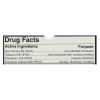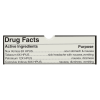Hello- I am looking for some input as to the next step I should use to help Barney a 14 yo ESS recover fully after a bought of vestibular dis-ease.
He presented with the normal loss of coordination, and he vomited a little white foam. He did have nystagmus too, but it was different than my previous dogs, in that it went up and then down to the right as opposed to the vertical slide to the left. We did take him to the vet so we could get him checked out and start anti-nausea medicine, and an antibiotic just in case there was an ear infection causing the inflammation. While we were there we also used the cold laser, in the hopes to decrease inflammation-since then I am worried that it was a mistake.
While on the antibiotic and anti-nausea medicine, we started adding a homeopathic combination by Hyland called Motion Sickness
It had most of the commonly suggested remedies for Vestibular Syndrome in it and it was accessible. He did improve a bit after using it, but it didn't seem to last nor push him towards a full recovery. I was able to get Cocculus Indicus in a 200c and tried that too, with only a slight improvement in his balance. A little bit after that we tried using some prednisone to see if it would help the vestibular symptoms and some arthritis issues he was having; however, it did not make any noticeable difference.
Next I tried making the motion sickness blend on my own and ordered a 30c potency of all of the ingredients listed in the Motion Sickness blend, again some improvement, but nothing dramatic even with trying different dosing patterns.
Barney right now, shows changes in his vision-I think he can see light, but I am not sure what else; It is really hard to tell and changes from day to day. I know a change in light really affects him. I feel like his hearing has diminished recently, and he has a lot of difficulty eating- almost like he has difficulty controlling his tongue. He circles to lay down, but I believe it is more a nerve signally issue than a neurological sign. He has a lot of fatty tumors and they seems to be more prominent now. Mornings are drunken sailor time. I find if you rub his body and stabilize him he can get a good bit of balance fairly quickly. Any ideas or input would be really helpful! I am going through the repertory, but it is slow going with all his symptoms past and present. Thank you all!

He presented with the normal loss of coordination, and he vomited a little white foam. He did have nystagmus too, but it was different than my previous dogs, in that it went up and then down to the right as opposed to the vertical slide to the left. We did take him to the vet so we could get him checked out and start anti-nausea medicine, and an antibiotic just in case there was an ear infection causing the inflammation. While we were there we also used the cold laser, in the hopes to decrease inflammation-since then I am worried that it was a mistake.
While on the antibiotic and anti-nausea medicine, we started adding a homeopathic combination by Hyland called Motion Sickness

It had most of the commonly suggested remedies for Vestibular Syndrome in it and it was accessible. He did improve a bit after using it, but it didn't seem to last nor push him towards a full recovery. I was able to get Cocculus Indicus in a 200c and tried that too, with only a slight improvement in his balance. A little bit after that we tried using some prednisone to see if it would help the vestibular symptoms and some arthritis issues he was having; however, it did not make any noticeable difference.
Next I tried making the motion sickness blend on my own and ordered a 30c potency of all of the ingredients listed in the Motion Sickness blend, again some improvement, but nothing dramatic even with trying different dosing patterns.
Barney right now, shows changes in his vision-I think he can see light, but I am not sure what else; It is really hard to tell and changes from day to day. I know a change in light really affects him. I feel like his hearing has diminished recently, and he has a lot of difficulty eating- almost like he has difficulty controlling his tongue. He circles to lay down, but I believe it is more a nerve signally issue than a neurological sign. He has a lot of fatty tumors and they seems to be more prominent now. Mornings are drunken sailor time. I find if you rub his body and stabilize him he can get a good bit of balance fairly quickly. Any ideas or input would be really helpful! I am going through the repertory, but it is slow going with all his symptoms past and present. Thank you all!

